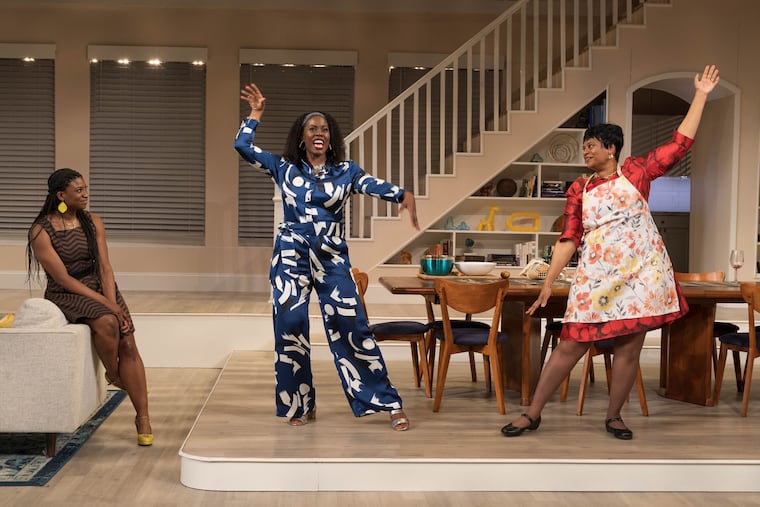Wilma Theater offers exuberant staging of the subversive ‘Fairview’
Philadelphia's own Pulitzer recipient, James Ijames, directs Jackie Sibblies Drury's Pulitzer-winning play

Jackie Sibblies Drury’s Fairview arrives at the Wilma Theater trailing clouds of glory: the 2019 Pulitzer Prize for Drama and other prestigious awards. The Wilma also is touting the fact that the show’s director — this season’s lead artistic director, James Ijames — has just won a Pulitzer of his own, for the play Fat Ham.
Fairview combines a lush physical production with avant-garde form and socially significant content. That’s the Wilma’s signature. Ijames presides over an exuberant staging and a splendid, high-energy cast, led by Brett Ashley Robinson as the teenage Keisha.
But will you enjoy this three-act, intermissionless, 95-minute satirical drama? Like Drury’s own pivots, audience reactions are unpredictable. If you go, prepare to be alternately engaged, frustrated, bored, disconcerted, and disoriented, and to exit without catharsis or closure.
Whether you buy a ticket to Fairview should depend on your appetite for theater that deconstructs racial tropes with abandon, disdains linearity, and embraces absurdity in service to a lesson at once unobjectionable and obvious: that Black people are sick and tired of being subject to the white gaze. Drury’s principal dramatic conceit is to analogize people of color to actors, forever performing for a privileged, demanding audience.
Fairview begins in sitcom land, with an affluent Black family preparing to host a birthday party for an offstage grandmother. Why this evening is so crucial that the mother, Beverly Frasier (an emotive Melanye Finister), remains in a state of high anxiety is among the play’s unsolved mysteries.
Beverly, whose riff on root vegetables is one of Fairview’s indisputable flashes of brilliance, is married to Dayton (Lindsay Smiling), a handsome flirt whose mastery of household tasks is negligible. The play’s theme is established in the opening lines, with Dayton observing Beverly and her protesting, “You don’t just watch a person ….”
One dinner guest is Beverly’s flamboyant sister, Jasmine (the wildly charismatic Jaylene Clark Owens), whom Dayton likens to a KGB, NSA, or FBI operative. Daughter Keisha shows up, too, tired from her own command performance as an indefatigable student-athlete.
The entire family erupts periodically into dance on Lawrence E. Moten III’s elegant set — an elite domain of beige shades, contemporary furniture, and abstract art. Maiko Matsushima’s eye-catching costumes complete the illusion. The superb lighting is by Thom Weaver, who stunningly concludes the show in bleached black and white.
When Beverly collapses, Fairview moves into second gear, with a group of white observers (including the always energetic Matteo Scammell as Jimbo) talking about race, tediously and stereotypically, from behind the house’s venetian blinds. While the events of the first act repeat, silently, the observers ponder what race they would most want to be. Partially obscured by the blinds, they are hard to see, and all too easy to tune out.
At times, they seem to be watching the play itself — before they merge with the Frasier family in a frenetic, gimmicky, illusion-upending finale.
“Fairview” is presented by the Wilma Theater, 265 S. Broad St., through June 26. Masks and vaccination proof required. Tickets: $25-$59, with discounts for students, artists, educators, and those under 40; for June 21-26, limited “pay what you will” tickets available at the box office or by phone. Information: wilmatheater.org or 215-546-7824.